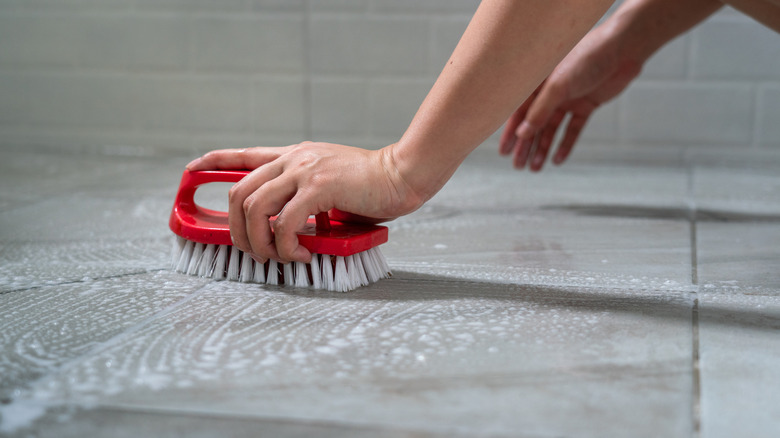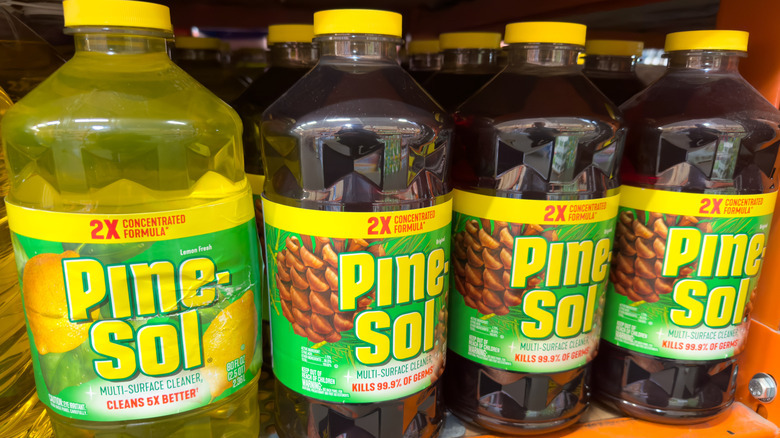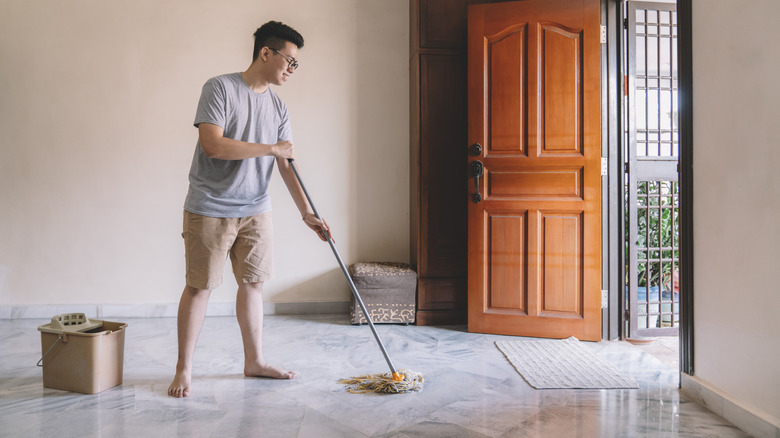Is Pine-Sol Actually Safe To Use To Clean Stone Floors?
Stone floors are extremely durable, but only if you use the correct products to clean them. Granite, for instance, can last 100 years, especially with proper and regular sealing. No wonder some granite floor suppliers have no qualms about giving a lifetime satisfaction warranty. Of course, stone floors are also easy to maintain and care for. Their smooth surface means dust won't settle between strands of fiber, so no breaking your back because you have to scrub or vacuum your floor daily. Needless to add, with their rich, textured look and varied color schemes, stone floors can add a beautiful and luxurious touch to your space.
That said, did you know that stone floors are also incredibly sensitive to different chemicals? While you likely won't have to worry about the durability of your flooring when it comes to scratches or chips, several cleaning products out there can easily ruin their appearance. Ultimately, it will come down to the type of stone; however, it's often not advisable to use acidic products to clean stone floors.
Is Pine-Sol safe to use on stone floors? As a homeowner, you should know the types of floors you should and shouldn't use Pine-Sol on. As we've already mentioned, when it comes to natural stone floors, the safety of Pine-Sol — as with many other cleaning products — will often depend on the type of stone floor. For instance, although Pine-Sol can be safe on sealed granite, it is not recommended for use on marble.
The stone floors that you can safely use Pine-Sol on
According to Pine-Sol, the brand's cleaners are safe to use on hard and nonporous surfaces. This means it's safe for plenty of different materials, like sealed wood, laminate flooring, and porcelain tile, but things can get a bit more complicated when it comes to natural stone. A material is deemed porous if it has little pores — small, tiny spaces — in its structure, and many types of stone are naturally porous.
If you look at the porosity of stone floors, you'll discover that granite is among the least porous. Its porosity ratio typically ranges from 0.4% to 1.5%. The other stone floor type that is considered nonporous is quartz, whose porosity ratio is essentially zero. Because of this, you can safely use Pine-Sol on granite and quartz flooring, and the brand has even shared a guide on how to properly dilute their products for use on these materials. For both types of nonporous stone, the brand recommends diluting 1/8 cup of Pine-Sol in a gallon of water, cleaning, and following up with a plain water rinse.
The stone floors that you can't safely use Pine-Sol on (&why)
While quartz and granite can be cleaned with Pine-Sol without causing damage, this rule doesn't apply to other types of stone flooring. Marble, for example, is incredibly porous. This means it can easily be damaged by household cleaners with acidic compounds, including vinegar and Pine-Sol. Moreover, the manufacturer makes it clear on its FAQ page that it doesn't recommend the use of Pine-Sol on marble surfaces. Several ingredients in Pine-Sol — including C13-18 alkyl sulfonate and citric acid — are acidic, with the former being a type of sulfonic acid. Therefore, to safely clean your marble floors like a pro, it's better to use a cleaning product with a neutral pH.
As for the rest of the stone floors out there, a safe rule of thumb is to stay away from Pine-Sol. Some of these stone floors are highly porous. Limestone, for instance, boasts a porosity ratio of as high as 31%. No wonder limestone is among the stone floors you can't clean with vinegar. One last thing: If you're not sure about whether to use Pine-Sol on your stone floor — or any cleaning product for that matter — it's a good idea to first test the product on a small, inconspicuous area and observe it for some time before concluding that it is safe.


